From Incarceration to Higher Education, Project Rebound Paves Path to Success
by Alan Llavore
Victimization and prison time. Marta Barreto, B.S. ’21, refers to her past as “a place of darkness.”
But thanks to a life-changing program called Project Rebound, Barreto graduated from Cal State San Bernardino in June with a bachelor’s degree, majoring in career and technical studies, and is now working toward an MBA.
Project Rebound supports the higher education and successful reintegration of formerly incarcerated individuals who want to enroll and succeed in the California State University system. By connecting students with critical resources, Project Rebound constructs an alternative to the revolving door policy of mass incarceration and increases community strength and safety.
Barreto, a devout Christian, says Project Rebound has been a blessing. “They saw me through the eyes of Christ. They empowered me. They said, ‘Don’t worry about your record, just keep pushing forward.’ And I’ve done that. I’m so grateful for the people at Project Rebound who believed in me and helped me overcome the darkness and arrive at a place of success.”
Barreto recently landed an internship and eventually hopes to work in human resources for an aerospace company, where she wants to make a positive impact and pass on to others what Project Rebound helped her accomplish.
Barreto’s experience is not unique. Project Rebound was created in 1967 at San Francisco State University by Professor John Irwin as a way to enroll people in classes directly from the criminal justice system. Irwin himself had served five years in prison, and after his release, he went on to earn a Ph.D. and serve as a professor at San Francisco State for 27 years. Since the program’s inception through 2020-21, at least 337 students systemwide have earned their degrees – 276 with bachelor’s degrees, 61 with master’s degrees.
In 2016, the program expanded to include eight additional CSU campuses, including CSUSB, to become known as the Project Rebound Consortium.
At that time, Annika Anderson, now associate professor of sociology, was in her first full year of teaching at Cal State San Bernardino and was searching for a way to work with formerly incarcerated individuals. Her interest led her to professor emerita of education Carolyn Eggleston, co-founder of CSUSB’s Center for the Study of Correctional Education, and together they applied for the $71,421 grant that brought Project Rebound to campus.
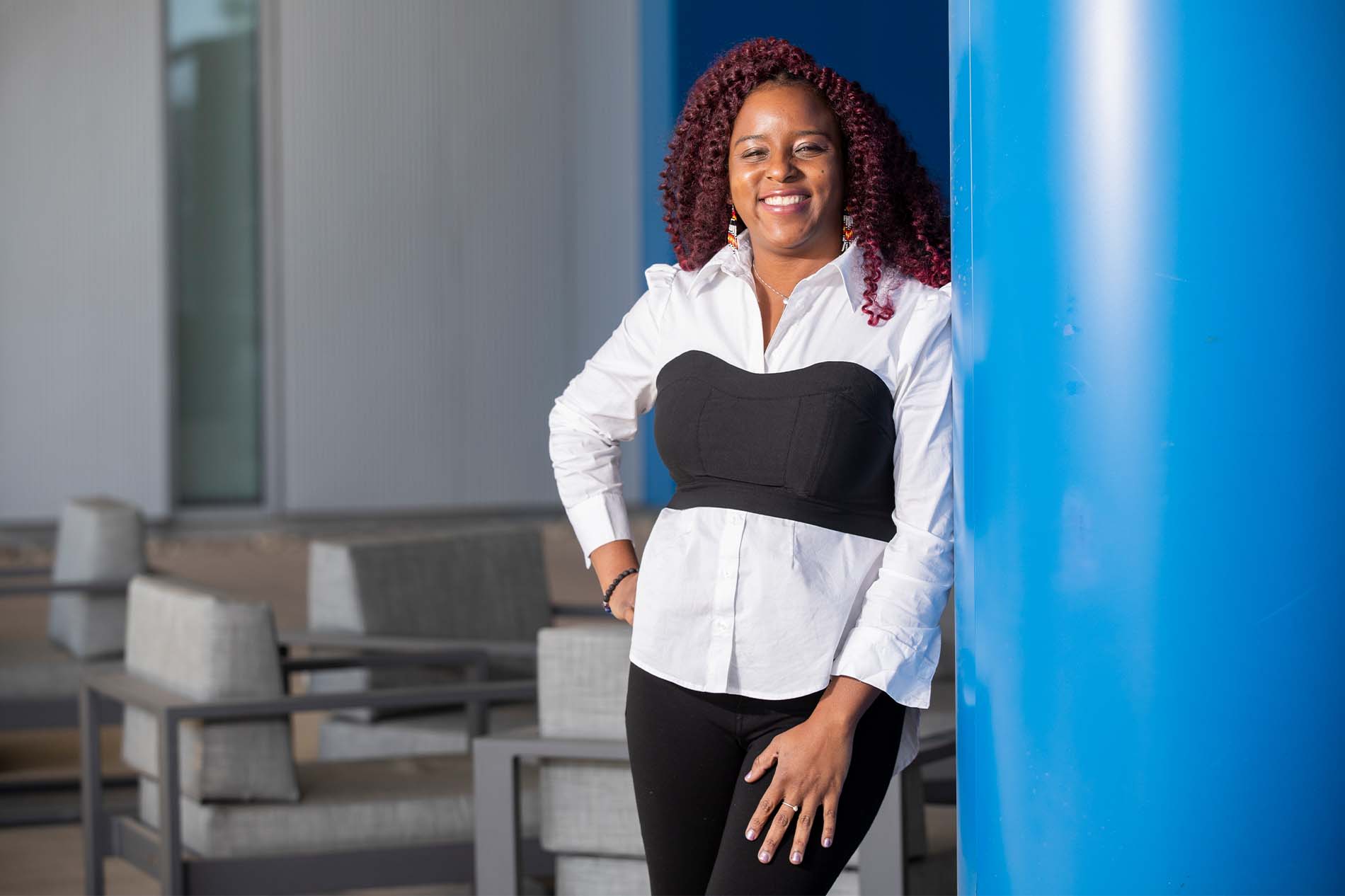
Annika Anderson, executive director/principal investigator, Project Rebound, and associate professor, Sociology, CSUSB
The first year, CSUSB’s Project Rebound program included Anderson, its executive director, Eggleston, its senior advisor, and one program director. The first cohort consisted of 19 students, including Paul Jones, the current program director who was then pursuing a master’s degree in social work. That year, the first three students graduated with bachelor’s degrees.
The program has come a long way in a short time. At the end of the 2019-20 academic year, there were 31 Project Rebound students: 22 undergraduate and nine graduate students. Eight earned bachelor’s degrees, and five completed their master’s degrees. Anderson remains the executive director and Jones. Additional staff includes a new outreach coordinator, a research/internship coordinator, a student assistant and a team of student interns. The budget grew to $275,000.
From 2016-17 through 2020-21, Project Rebound at CSUSB enrolled 116 students, with at least 38 completing their degrees (the number of Project Rebound graduates for 2020-21 was not available).
“It’s kind of amazing for me to see how the year-one highlights differ from year five-highlights,” says Anderson. “Not just the budget, but all the accomplishments. I’m really proud of that.”
According to the CSU 2021 Project Rebound annual report, formerly incarcerated students face unique challenges and are more likely to persist and graduate when they have access to employment, transportation, housing and food security, mental health support services and a caring community. The program helps students overcome these obstacles by providing them with direct financial support for critical needs such as application, test and graduation fees, monthly meal stipends, parking or bus passes, semester stipends for book and school supplies, access to free printing, employment opportunities on campus, and transitional housing support, often close to campus.
A 2019 California State Auditor’s report found that while the number of inmates housed in state prisons has decreased in recent years, the number of formerly incarcerated returning to prison – the recidivism rate – has “remained stubbornly high, averaging around 50 percent over the past decade.” According to the California Department of Corrections and Rehabilitation, as of 2020, about 46% of offenders released in California are reconvicted within three years of release and even more are rearrested.
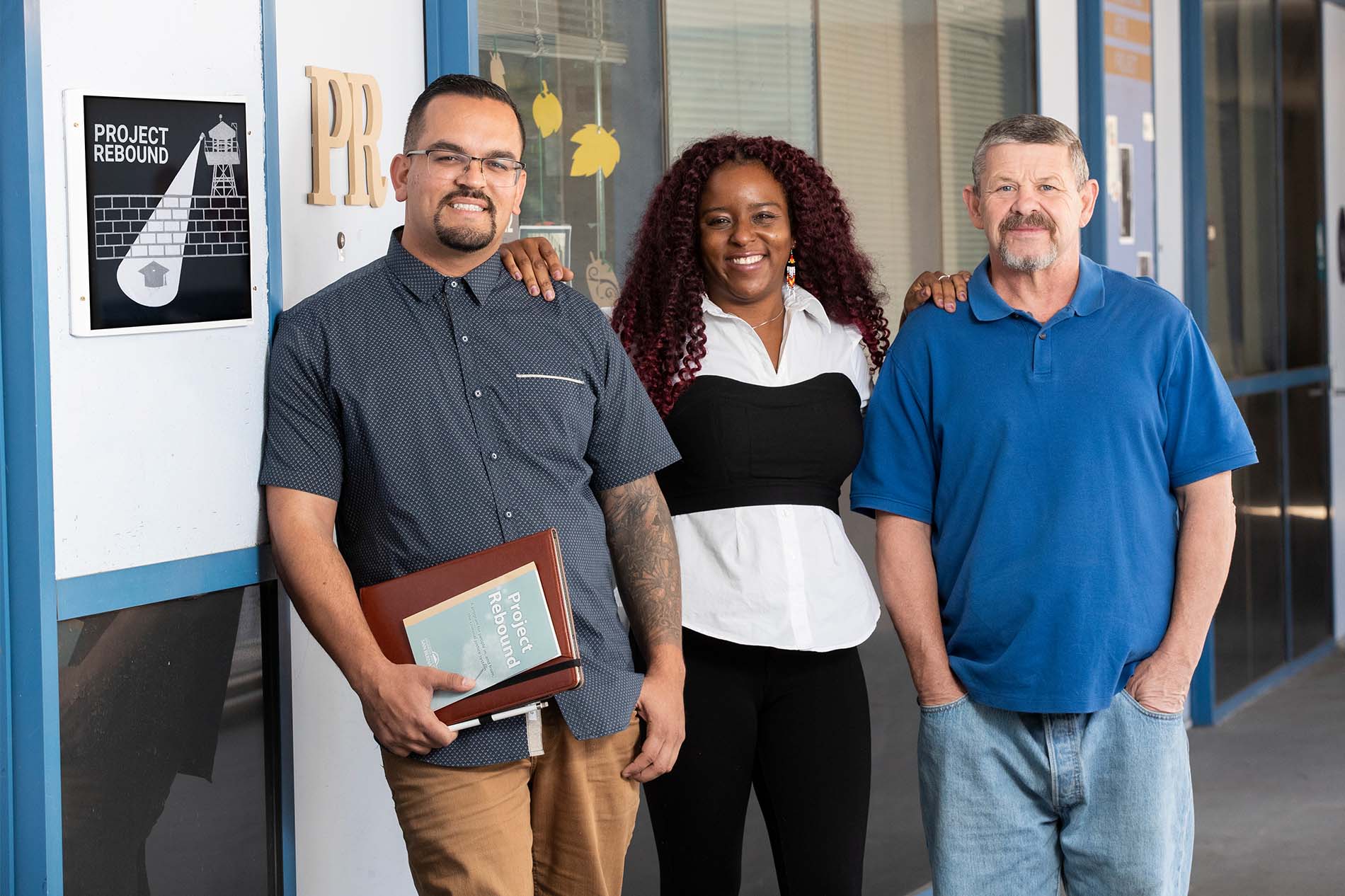
(L to R) Michael Griggs, outreach coordinator, Project Rebound, CSUSB; Annika Anderson, executive director/principal investigator, Project Rebound, CSUSB; and Paul A. Jones, program director, Project Rebound, CSUSB
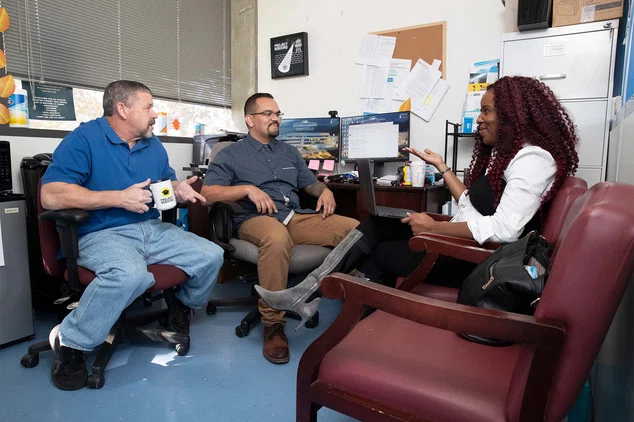
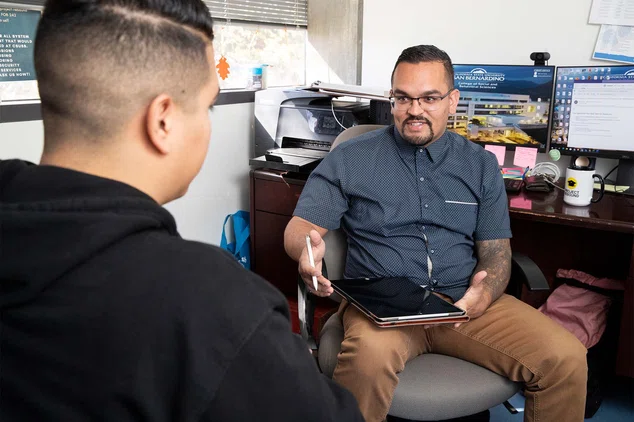
Statistics show efforts to break that cycle by the CSU Project Rebound Consortium, now comprised of 14 CSU campuses, have been successful, boasting a consortium-wide recidivism rate of zero.
Anderson said education plays a key role. “We know that most people who are incarcerated will get out eventually,” she says. “If Project Rebound is going to improve someone’s life, it’s going to make it better in a sense that they get college degrees and they go out and become a positive force in the world, I think that’s important.”
To be eligible for CSUSB’s Project Rebound program, prospective students must: have been formerly incarcerated or have prior criminal justice system involvement; live or are paroled in the greater Los Angeles metropolitan area; possess the ability and commitment to perform college-level work; be motivated to succeed and benefit from a college education; and maintain satisfactory academic progress and complete at least six units each semester.
Jones, Project Rebound program director, has experienced the challenges and successes from both sides of the program, as a student and an administrator. In 2016, as a social work graduate student, he had difficulty finding an internship, and was encouraged by professor of social work Deidre Lanesskog to apply to Project Rebound.
“I had the typical response of someone of my mentality. ‘I’m not good enough, she (Anderson) is not going to hire me, I’m not qualified,’” Jones recalls. “Dr. Lanesskog really encouraged me, telling me, ‘You don’t know unless you try.’”
Jones was promoted to project director as he completed his MSW. Along the way, he also co-authored a chapter, “Reentry in the Inland Empire: The Prison to College Pipeline with Project Rebound,” published in an edited volume, “Prisoner Reentry in the 21st Century: Critical Perspectives of Returning Home.” He also is an associate clinical social worker who is working toward becoming a licensed clinical social worker.
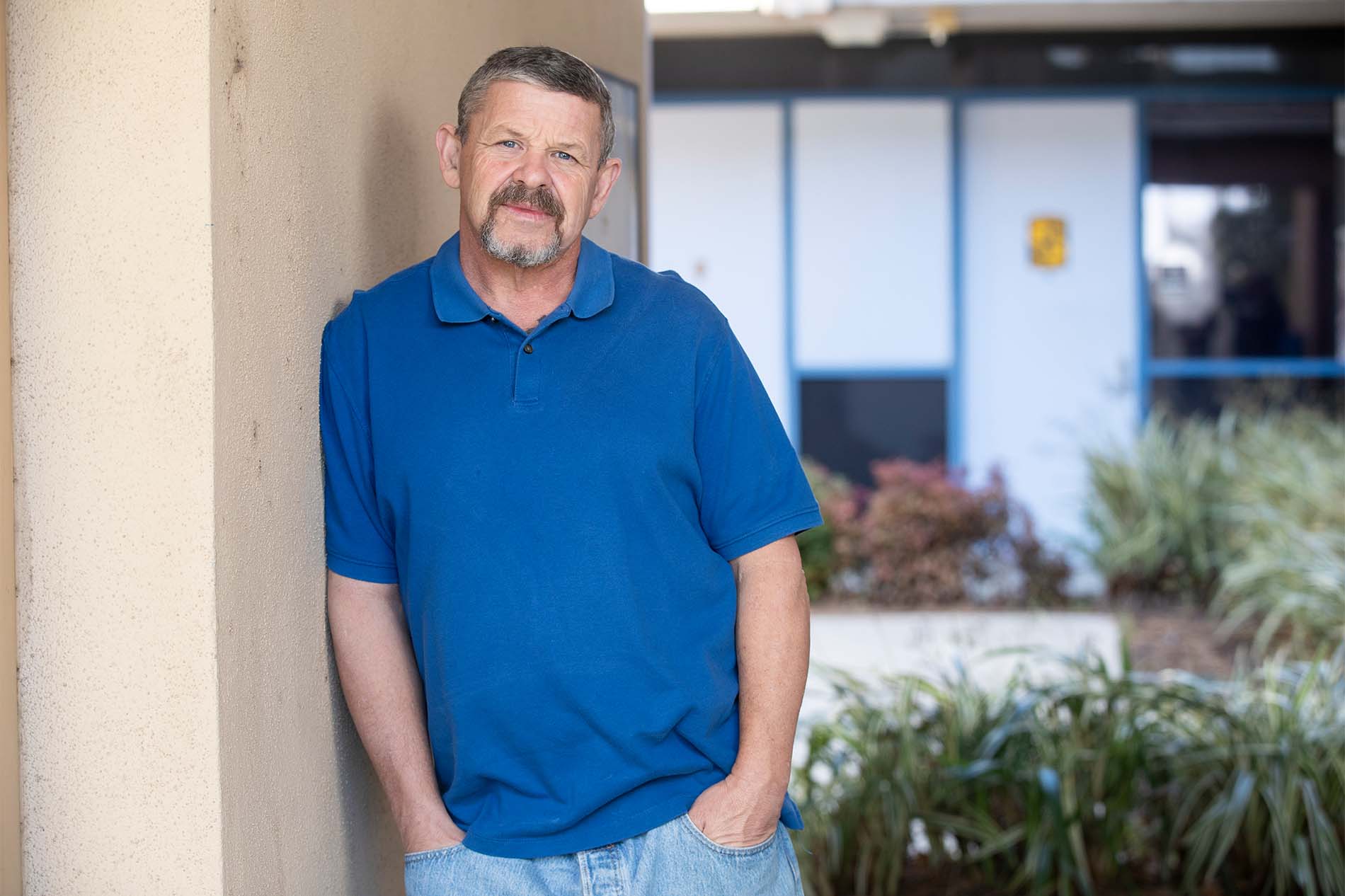
Paul A. Jones, program director, Project Rebound, CSUSB
Project Rebound includes many more success stories. “Paul is one example. Formerly incarcerated. Master’s degree in social work. He’s a professor (Jones is a lecturer in CSUSB’s School of Social Work),” says Michael Griggs, CSUSB Project Rebound’s outreach coordinator, the newest member of its leadership team. Like Jones, he is formerly incarcerated and a college graduate. “At the barbecue for Project Rebound graduates, I met an alumnus who is also a college instructor at San Bernardino Valley College. Others have gone on to be engineers. There’s no limit to what someone formerly incarcerated can do.”
Jones credits Anderson for much of his success. “For somebody who comes from my background, not only to get an MSW, but to graduate as a published author, I think it just goes to the vision of Dr. Anderson.”
Project Rebound’s campus location gives its students a safe place to talk about the challenges they face, not just academically, but about life in general. Many Project Rebound students have to deal with the stigma associated with their pasts, “but it’s no longer who they are today,” Jones says.
During the fall 2021 semester, Anderson and the Project Rebound staff – with the Center for the Study of Correctional Education, Faculty Center for Excellence, Staff Development Center, and Division of Student Affairs – launched a four-part ally workshop series via Zoom for CSUSB staff and faculty to learn how to serve Project Rebound students and to increase understanding and awareness of the program. The series also caught the attention of advocates off campus and out of state. “It had broader reach than I thought it would,” Anderson says.
Several CSUSB Project Rebound alumni participated in the workshops to share their experiences, as well as their personal and career goals, including Barreto, Tabiri Zahir, MSW, ’21, and Maurice J. Woods, B.A., ’18.
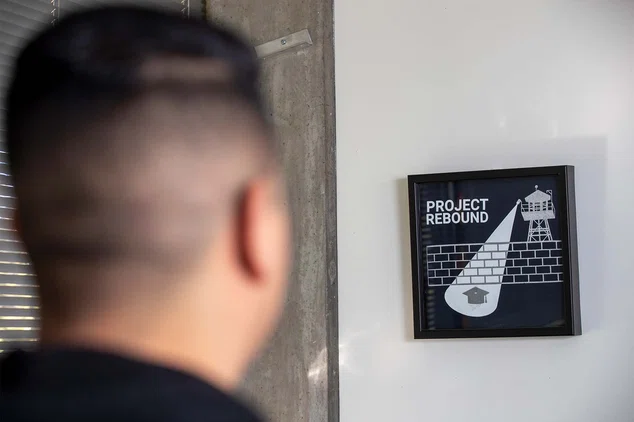
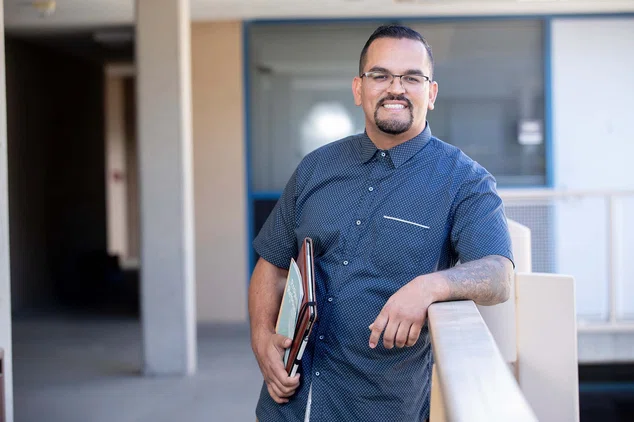
Zahir, now a re-entry manager for the Tayba Foundation, works with the formerly incarcerated as they transition from prison to the community. According to Zahir, “Those who are closest to the problem are also closest to the solution.”
Woods, a field director for the Prison Fellowship, also works with the incarcerated and formerly incarcerated, with a focus on rehabilitation. Woods said Project Rebound was a place where he was accepted. “I was loved on, and I had the opportunity to have like-minded individuals around me to offer support and encouragement,” he said. “I wasn’t alone. I was around people who really understood the battles that we go through on top of just regular life with having the background of being formerly incarcerated.”
In the spring, Project Rebound, working with CSUSB’s College of Extended and Global Education, will expand its reach when it launches the Addiction Studies Certificate Program, one of the program’s top three initiatives for the 2021-22 academic year. Jones, a licensed drug and alcohol counselor, is one of the program’s instructors. According to Jones, for the formerly incarcerated who don’t yet meet the CSU’s enrollment requirements, the program could bring them one step closer to furthering their education and preparing for a career. To enroll in the certificate program, a high school diploma is required, which most of the formerly incarcerated have, he noted.
After completing the certificate program and earning a drug counseling credential, Jones said formerly incarcerated individuals are eligible for employment with the county, which offers health insurance and retirement benefits, a plus for those seeking a fresh start.
“If we can just reach one person who just got out of prison to see our vision and jump on this road with us, and they’ve done something successful, then we’ve done something for the community. That individual now has a job and is not committing crimes,” he says. “Embracing education is one way to break the cycle of recidivism. No one wants to return to incarceration.”

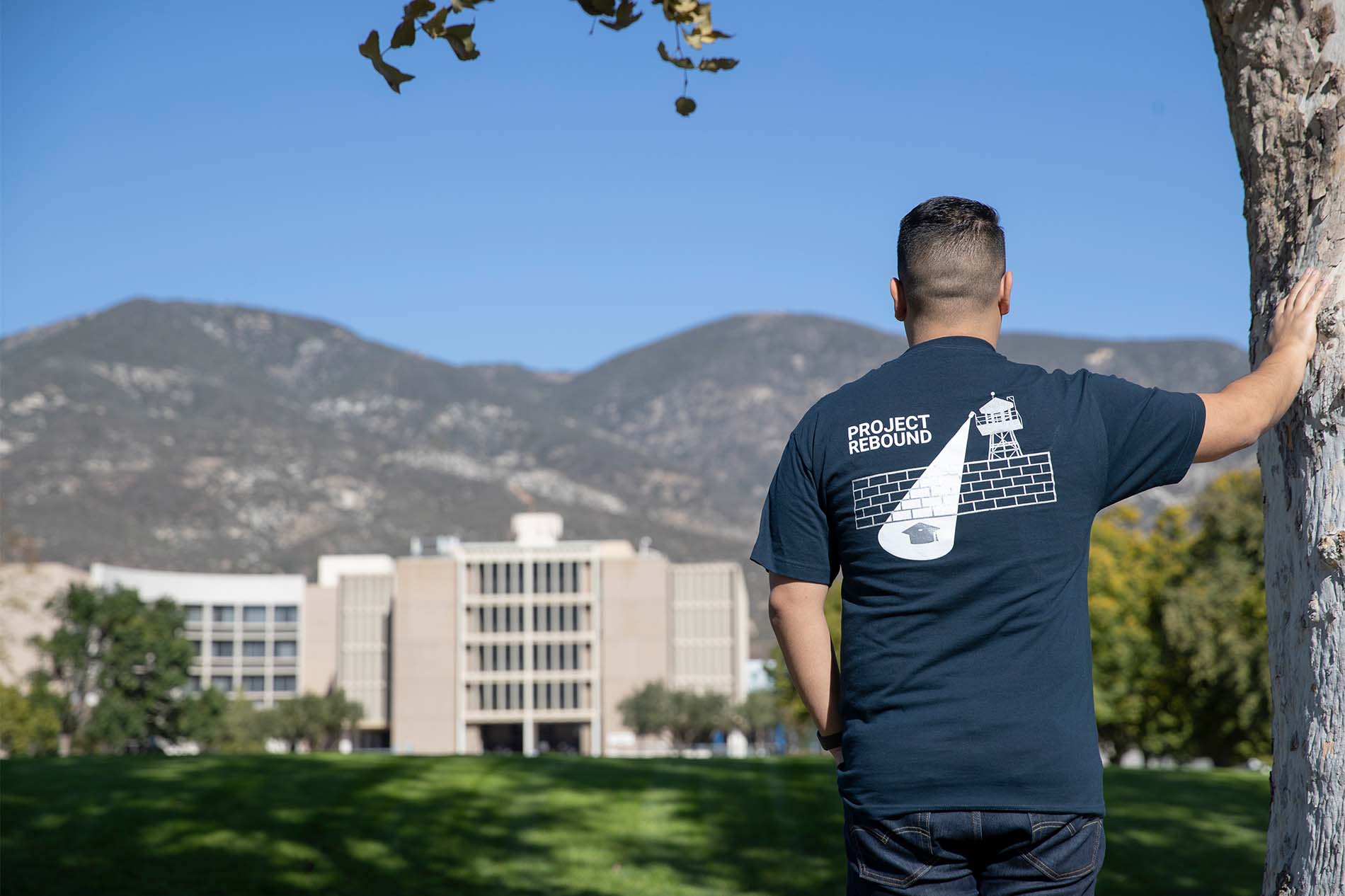
CSUSB: A Longstanding Commitment to Educating the Incarcerated and Formerly Incarcerated
Prior to the arrival of Project Rebound in 2016, CSUSB already had a long history of working with the incarcerated and formerly incarcerated persons. In 1993, professor emerita of education Carolyn Eggleston and professor emeritus of education Thom Gehring co-founded the Center for the Study of Correctional Education. This interdisciplinary center provides professional development for prison educators and supports research initiatives related to prison education and reentry to civilian society.
In 2006, the Cal State University San Bernardino Reentry Initiative (CSRI), an off-campus program in partnership with the state Department of Corrections and Rehabilitation, was created. The initiative provides multiservice centers to assist the formerly incarcerated when they are released from prison and returning home.
Since 2009, the university’s Institute of Child Development and Family Relations has been working with the San Bernardino County Sheriff Department to offer parenting classes through the Parent Intervention Project for the incarcerated and those just reentering the community.
CSUSB: A Longstanding Commitment to Educating the Incarcerated and Formerly Incarcerated
Prior to the arrival of Project Rebound in 2016, CSUSB already had a long history of working with the incarcerated and formerly incarcerated persons. In 1993, professor emerita of education Carolyn Eggleston and professor emeritus of education Thom Gehring co-founded the Center for the Study of Correctional Education. This interdisciplinary center provides professional development for prison educators and supports research initiatives related to prison education and reentry to civilian society.
In 2006, the Cal State University San Bernardino Reentry Initiative (CSRI), an off-campus program in partnership with the state Department of Corrections and Rehabilitation, was created. The initiative provides multiservice centers to assist the formerly incarcerated when they are released from prison and returning home.
Since 2009, the university’s Institute of Child Development and Family Relations has been working with the San Bernardino County Sheriff Department to offer parenting classes through the Parent Intervention Project for the incarcerated and those just reentering the community.

